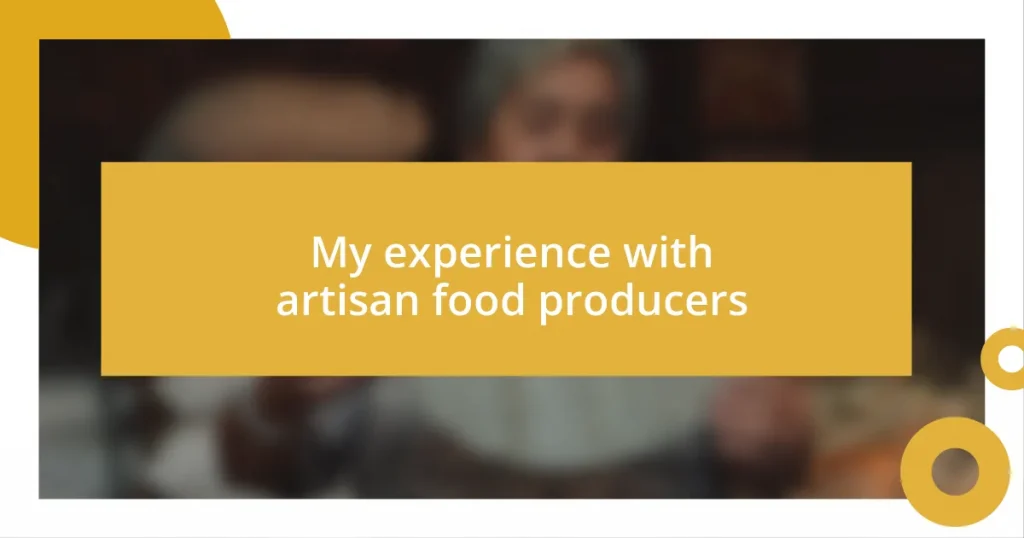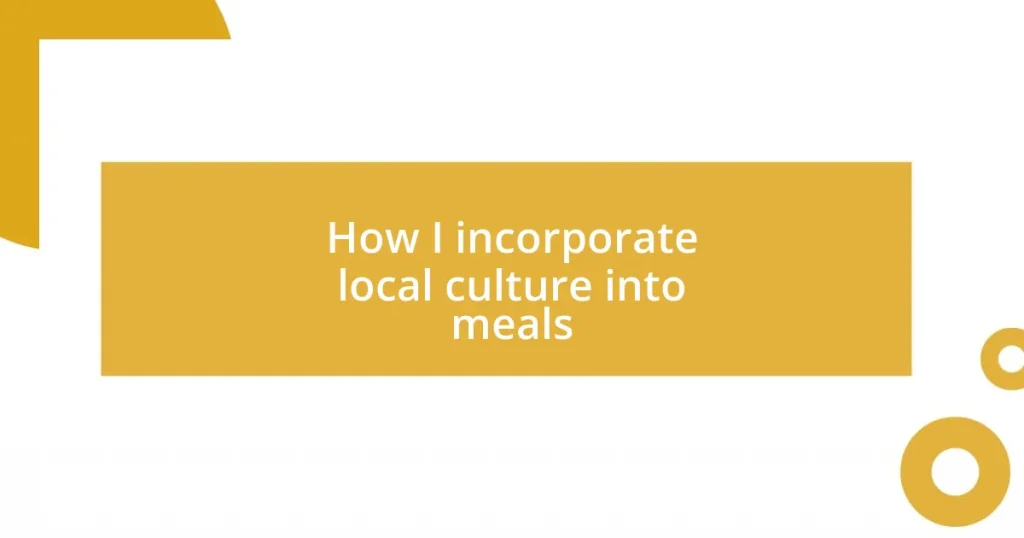Key takeaways:
- Artisan food producers focus on quality, local ingredients, and sustainability, often sharing unique stories behind their products.
- Finding local artisan foods can be an adventure through farmers’ markets, social media, and community connections.
- Building relationships with producers enhances the culinary experience, leading to deeper appreciation and community connections.
- Supporting sustainable practices not only benefits the environment but also elevates the quality and flavor of food products.
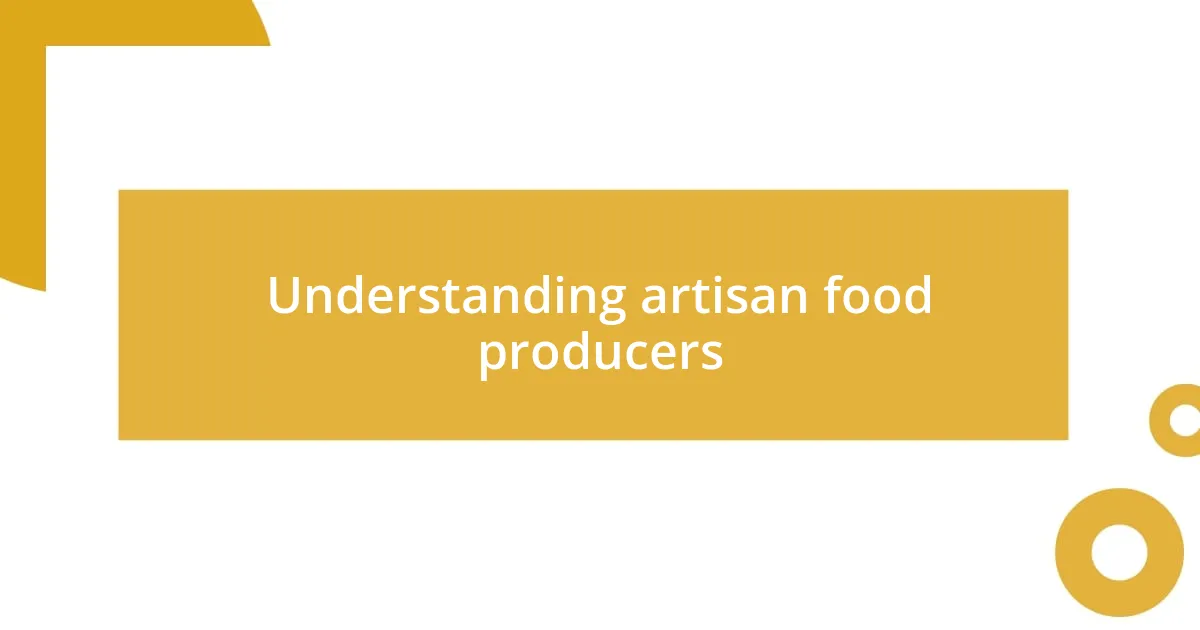
Understanding artisan food producers
Artisan food producers are often the hidden gems of the culinary world. I remember visiting a small cheese maker tucked away in the countryside; the owner shared how each batch of cheese is crafted with passion and tradition. Have you ever tasted a product so unique that it felt like you were experiencing history in every bite?
These producers prioritize quality over quantity, which fosters a deeper connection with their customers. I once stood mesmerized as a baker explained her sourdough starter and its journey through time, almost like it had a personality of its own. Isn’t it fascinating how food can carry stories and emotions that transcend the ordinary?
What truly sets artisan food producers apart is their commitment to local ingredients and sustainable practices. I recall a delightful encounter with a farmer at a market, who animatedly described his relationship with the land, emphasizing how it influences the flavors in his products. When you think about it, doesn’t knowing where your food comes from make it even more special?
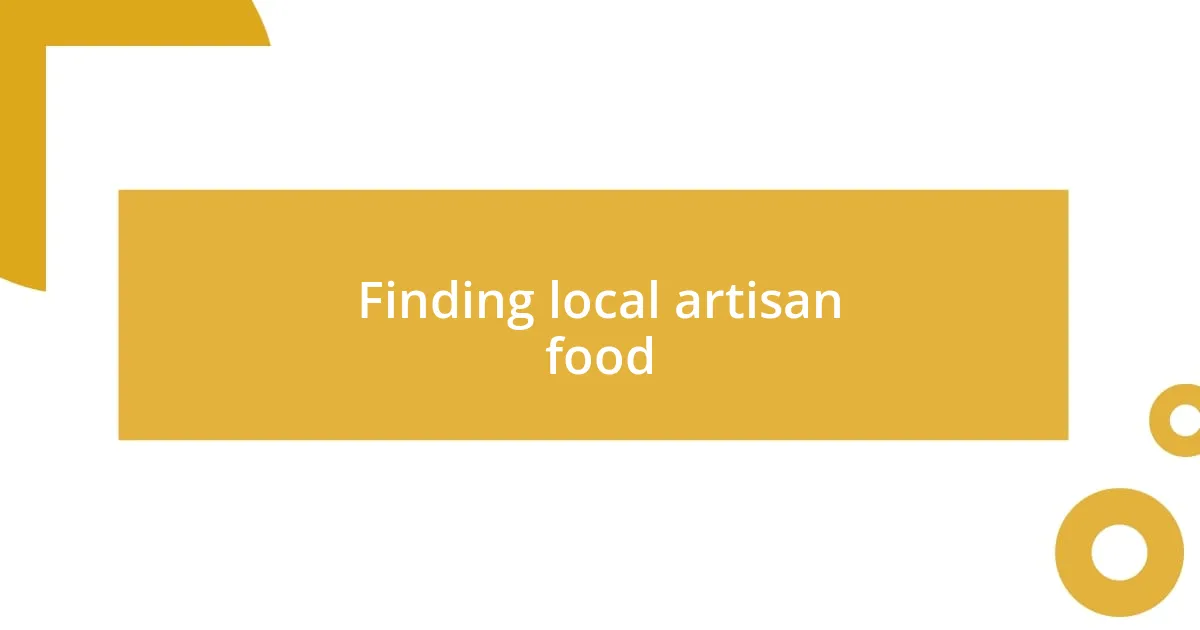
Finding local artisan food
When embarking on the journey to find local artisan food, I often feel like I’m treasure hunting in my own community. While exploring farmers’ markets or quaint local shops, I’ve discovered artisans who pour their hearts into every product. One Saturday, I stumbled upon a little olive oil vendor whose passion for his craft was palpable as he recounted how each bottle is a celebration of his family’s heritage. It’s these personal backstories that transform our grocery runs into meaningful experiences.
To help you in your quest for local artisan food, here are some tips I’ve found useful:
- Visit Farmers’ Markets: These are often the best places to meet local producers and sample their goods.
- Follow Social Media: Many artisans showcase their products and stories online, allowing you to connect with them even before visiting.
- Ask Locals: Engaging your community can lead to hidden gems that you might not find elsewhere.
- Join Workshops or Classes: Some producers offer experiences that let you learn about their craft firsthand.
- Explore Specialty Stores: Local shops often feature artisan products, providing an opportunity to discover new favorites.
By immersing myself in these local experiences, I’ve cultivated not only a taste for unique foods but also friendships with the artisans behind them. There’s a special connection forged through food, and I encourage everyone to seek it out.

The benefits of artisan products
The beauty of artisan products lies in their authenticity. Each item tells a story, often rooted deeply in the community where it’s produced. I still remember savoring a handcrafted chocolate bar and being mesmerized by the chocolatier’s journey from bean to bar. It felt like I was not just tasting chocolate, but also the dedication and love that went into it. Isn’t it compelling to think that a simple food item can encapsulate so much passion?
Another significant benefit is the unique flavors found in artisan foods. Unlike mass-produced items that often rely on uniformity, artisan producers embrace the variability in their ingredients, leading to truly distinctive products. I once enjoyed a jar of handmade jam, bursting with flavors that reminded me of my grandmother’s garden in summer. This personal connection to food enhances the experience, making each bite more meaningful. Who wouldn’t agree that tasting the vibrancy of fresh strawberries brings back sweet childhood memories?
Lastly, artisan products often prioritize ethical sourcing and sustainability, which resonates deeply with mindful consumers. When I purchased a batch of granola from a local producer, I learned that all the ingredients were sourced from nearby farms practicing sustainable agriculture. This knowledge not only satisfied my taste buds but also my conscience. Don’t we all want to support practices that care for our planet?
| Benefit | Description |
|---|---|
| Authenticity | Artisan products carry unique stories and traditions, connecting consumers to their origins. |
| Unique Flavors | Craftsmanship allows for variability, offering distinctive flavors that mass-produced items often lack. |
| Sustainability | Many artisan producers prioritize ethical and sustainable sourcing, promoting environmental stewardship. |
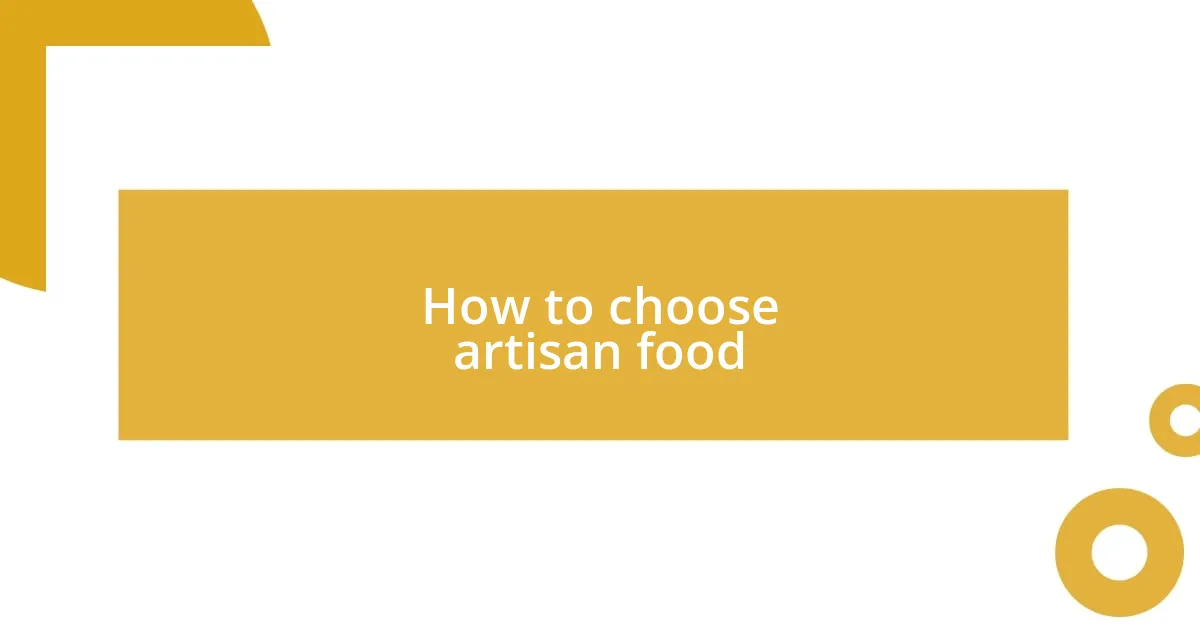
How to choose artisan food
Choosing artisan food can feel like an adventure of its own. Personally, I look for vibrant flavors that speak to me. I recall visiting a local cheesemaker whose passionate description of her cheese-making process captured my attention—it felt like I could taste her dedication in every bite. Have you ever experienced something similar, where the backstory enhances the flavor?
When selecting artisan products, I always pay attention to the ingredient list. Simplicity often indicates quality. I remember one day, I picked up a jar of honey that had just two ingredients: honey and the flowers the bees visited. The sweetness was unlike anything I’d bought before. It struck me how important it is to support those who focus on craftsmanship rather than shortcuts.
Another consideration is seasonal offerings. I’ve learned that artisan producers often highlight their ingredients’ natural cycles. For instance, my excitement peaked when I discovered a small bakery that only made pumpkin bread during harvest season. The first loaf I brought home was a burst of autumn in every slice. Isn’t it satisfying to know that the food you eat reflects the season’s essence?

Building relationships with producers
Building meaningful relationships with artisan food producers has been one of the most rewarding parts of my culinary journey. I still remember the first time I met a local baker at a farmer’s market; his passion for sourdough was infectious. He shared with me how each loaf is a labor of love, shaped by the unique qualities of the local yeast. Can you imagine how that connection transforms a simple loaf of bread into something truly special?
Over time, I’ve learned that nurturing these relationships goes beyond mere transactions. I often engage in conversations with the producers, asking them about their methods and inspirations. Recently, I visited a small cheese farm where the owner passionately described her traditions passed down through generations. This opportunity to hear first-hand accounts not only deepens my appreciation for their craft but also makes my purchases feel more personal. Do you find that building a rapport with producers enhances your overall experience?
Additionally, I’ve discovered that these connections can also pave the way for collaborative experiences. I once joined a cheese-making workshop hosted by one of my favorite local artisans. Not only did I gain knowledge about her techniques, but the camaraderie among participants created a sense of community. It was exhilarating to learn alongside others who share similar tastes and values. Isn’t it fascinating how food can connect us, fostering relationships that go beyond the plate?

Exploring unique artisan offerings
Exploring unique artisan offerings has often felt like uncovering hidden treasures. One day, I found a small jar of spicy mustard made by a local producer who used heirloom seeds. The moment I tried it, the vibrant heat and complexity swept me off my feet. Have you ever stumbled upon a flavor that completely changed your perception of a familiar ingredient?
Another memorable experience was discovering a chocolatier who sourced cocoa beans directly from farmers in Madagascar. I remember savoring a single square of chocolate and being taken aback by the fruity undertones that danced on my palate. It was more than just a treat; it was a story of terroir, sustainability, and collaboration. Don’t you think it’s amazing how the origin of a product can profoundly shape its flavor?
Lately, I’ve been exploring artisan pickles, which have completely redefined my view on fermented foods. I recall trying a jar of dill and garlic pickles from a neighborhood vendor—it felt like a burst of freshness wrapped around a crispy crunch. Each bite reminded me of summer picnics, and I found myself sharing them with friends, hoping they’d understand my newfound obsession. Have you tasted pickles that transported you back to a cherished memory?
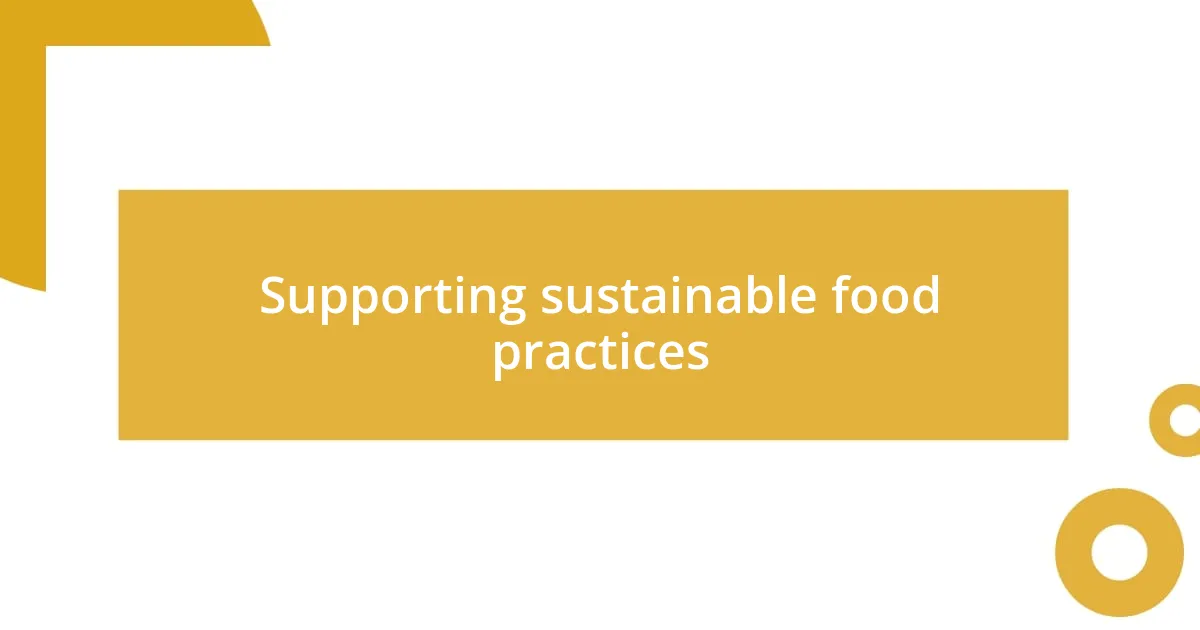
Supporting sustainable food practices
Supporting sustainable food practices is something I’ve come to value immensely. I remember attending a workshop run by a local farmer who grew organic vegetables. As he talked about crop rotation and soil health, it struck me how every choice we make impacts the environment. Do you ever think about the journey your food takes before it reaches your table? These simple, sustainable practices not only nurture the land but also contribute to vibrant flavors that truly shine in the dishes I create.
One particular experience that stands out was visiting a sustainable seafood producer on the coast. They emphasized the importance of responsible fishing practices and preserving local ecosystems. I had the chance to try freshly caught fish, and the difference was palpable. It sparked a deep appreciation in me for supporting businesses that not only prioritize the welfare of our oceans but also bring nutrient-rich options to our plates. Have you ever tasted something so fresh that it redefined your notion of freshness?
Furthermore, I find that supporting sustainable producers often leads to unexpected creativity in the kitchen. I discovered a local herb farm that practices permaculture, and their vibrant, organic offerings inspired me to experiment with flavors I hadn’t considered before. One evening, I created a dish featuring their fresh basil, and the fragrance floating through my kitchen was absolute bliss. Doesn’t it feel rewarding to know that the ingredients in your meals are cultivated with care and intention? Each bite becomes a delightful reminder of the sustainable choices we can make together.










